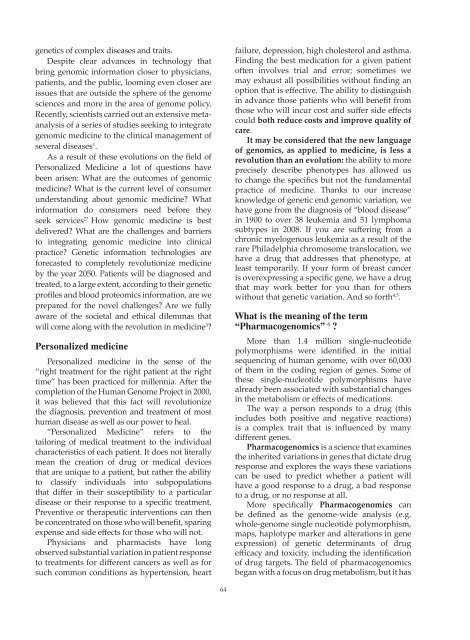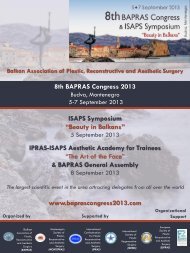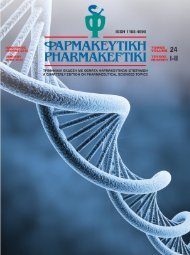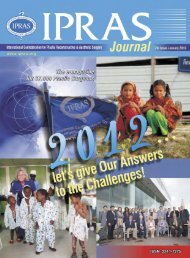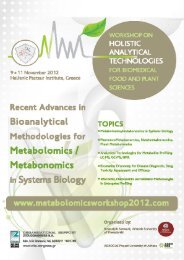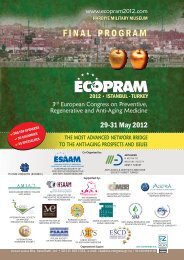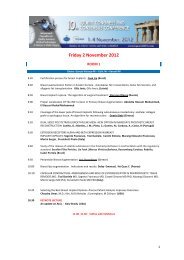Pharmaceutical Industry and Green Chemistry
Pharmaceutical Industry and Green Chemistry
Pharmaceutical Industry and Green Chemistry
Create successful ePaper yourself
Turn your PDF publications into a flip-book with our unique Google optimized e-Paper software.
genetics of complex diseases <strong>and</strong> traits.<br />
Despite clear advances in technology that<br />
bring genomic information closer to physicians,<br />
patients, <strong>and</strong> the public, looming even closer are<br />
issues that are outside the sphere of the genome<br />
sciences <strong>and</strong> more in the area of genome policy.<br />
Recently, scientists carried out an extensive metaanalysis<br />
of a series of studies seeking to integrate<br />
genomic medicine to the clinical management of<br />
several diseases 1 .<br />
As a result of these evolutions on the field of<br />
Personalized Medicine a lot of questions have<br />
been arisen: What are the outcomes of genomic<br />
medicine? What is the current level of consumer<br />
underst<strong>and</strong>ing about genomic medicine? What<br />
information do consumers need before they<br />
seek services 2? How genomic medicine is best<br />
delivered? What are the challenges <strong>and</strong> barriers<br />
to integrating genomic medicine into clinical<br />
practice? Genetic information technologies are<br />
forecasted to completely revolutionize medicine<br />
by the year 2050. Patients will be diagnosed <strong>and</strong><br />
treated, to a large extent, according to their genetic<br />
profiles <strong>and</strong> blood proteomics information, are we<br />
prepared for the novel challenges? Are we fully<br />
aware of the societal <strong>and</strong> ethical dilemmas that<br />
will come along with the revolution in medicine 3 ?<br />
Personalized medicine<br />
Personalized medicine in the sense of the<br />
“right treatment for the right patient at the right<br />
time” has been practiced for millennia. Aer the<br />
completion of the Human Genome Project in 2000,<br />
it was believed that this fact will revolutionize<br />
the diagnosis, prevention <strong>and</strong> treatment of most<br />
human disease as well as our power to heal.<br />
“Personalized Medicine” refers to the<br />
tailoring of medical treatment to the individual<br />
characteristics of each patient. It does not literally<br />
mean the creation of drug or medical devices<br />
that are unique to a patient, but rather the ability<br />
to classify individuals into subpopulations<br />
that differ in their susceptibility to a particular<br />
disease or their response to a specific treatment.<br />
Preventive or therapeutic interventions can then<br />
be concentrated on those who will benefit, sparing<br />
expense <strong>and</strong> side effects for those who will not.<br />
Physicians <strong>and</strong> pharmacists have long<br />
observed substantial variation in patient response<br />
to treatments for different cancers as well as for<br />
such common conditions as hypertension, heart<br />
failure, depression, high cholesterol <strong>and</strong> asthma.<br />
Finding the best medication for a given patient<br />
oen involves trial <strong>and</strong> error; sometimes we<br />
may exhaust all possibilities without finding an<br />
option that is effective. The ability to distinguish<br />
in advance those patients who will benefit from<br />
those who will incur cost <strong>and</strong> suffer side effects<br />
could both reduce costs <strong>and</strong> improve quality of<br />
care.<br />
It may be considered that the new language<br />
of genomics, as applied to medicine, is less a<br />
revolution than an evolution: the ability to more<br />
precisely describe phenotypes has allowed us<br />
to change the specifics but not the fundamental<br />
practice of medicine. Thanks to our increase<br />
knowledge of genetic end genomic variation, we<br />
have gone from the diagnosis of “blood disease”<br />
in 1900 to over 38 leukemia <strong>and</strong> 51 lymphoma<br />
subtypes in 2008. If you are suffering from a<br />
chronic myelogenous leukemia as a result of the<br />
rare Philadelphia chromosome translocation, we<br />
have a drug that addresses that phenotype, at<br />
least temporarily. If your form of breast cancer<br />
is overexpressing a specific gene, we have a drug<br />
that may work beer for you than for others<br />
without that genetic variation. And so forth 4,5 .<br />
What is the meaning of the term<br />
“Pharmacogenomics” 6 ?<br />
More than 1.4 million single-nucleotide<br />
polymorphisms were identified in the initial<br />
sequencing of human genome, with over 60,000<br />
of them in the coding region of genes. Some of<br />
these single-nucleotide polymorphisms have<br />
already been associated with substantial changes<br />
in the metabolism or effects of medications.<br />
The way a person responds to a drug (this<br />
includes both positive <strong>and</strong> negative reactions)<br />
is a complex trait that is influenced by many<br />
different genes.<br />
Pharmacogenomics is a science that examines<br />
the inherited variations in genes that dictate drug<br />
response <strong>and</strong> explores the ways these variations<br />
can be used to predict whether a patient will<br />
have a good response to a drug, a bad response<br />
to a drug, or no response at all.<br />
More specifically Pharmacogenomics can<br />
be defined as the genome-wide analysis (e.g.<br />
whole-genome single nucleotide polymorphism,<br />
maps, haplotype marker <strong>and</strong> alterations in gene<br />
expression) of genetic determinants of drug<br />
efficacy <strong>and</strong> toxicity, including the identification<br />
of drug targets. The field of pharmacogenomics<br />
began with a focus on drug metabolism, but it has<br />
64


